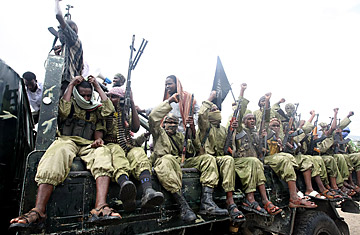
Hard-line Islamist fighters from al-Shabab chant slogans as they rally in Mogadishu
Ask U.S. security experts what violent extremist group costs them the most sleep at night and the answer might very well be al-Shabab. Though not as far-reaching or well-known as al-Qaeda, the Somalia-based al-Shabab is particularly troubling to American officials due to its active recruitment of U.S. citizens — particularly from the large Somali community in and around Minneapolis — to join its battle against Mogadishu's weak interim government. In October 2008, the first known American suicide bomber — a 26-year-old Somali-American fighting with al-Shabab — blew himself up in northern Somalia. In one of the broadest domestic terrorism investigations since Sept. 11, federal officials have charged 14 people with recruiting an estimated 20 Americans to join the radical Islamist group since late 2007. And in its most recent attack, a suicide bomber disguised as a veiled woman killed three Somali government ministers and at least 16 others attending a med-school graduation ceremony at a Mogadishu hotel. The Dec. 3 bombing killed several doctors and medical students, rare professional caregivers in a battered nation that needs them desperately.
Outsiders know relatively little about al-Shabab — Arabic for "the youth," also spelled al-Shabbab. The group is believed to have formed in mid-2004 as the military wing of the Islamic Court Union, a radical group that controlled much of Somalia before being ousted by the Ethiopian army in a U.S.-backed invasion in 2006. (Somalia has been without a strong central government since dictator Mohamed Siad Barre was overthrown by warlords in 1991. Conflict in the Horn of Africa nation — one of the world's most lawless — has killed more than 19,000 people in the past three years alone.) Al-Shabab's membership is estimated to number in the thousands; its fighters are identifiable by their red-and-white scarves. The group began fighting Ethiopian troops and the weak interim government almost immediately after the invasion; today it controls large areas of the nation's central and southern regions. Al-Shabab carries out near daily attacks against the government as well as against aid groups and African Union peacekeepers operating in the country. Its members are mainly Somalis, though it has also attracted fighters from the U.S., Yemen and Pakistan as well as recruits from other African nations. The official head of al-Shabab is Sheik Mohamed Mukhtar Abdirahman, known as Abu Zubeyr, though several senior officials are believed to guide the group, which is divided into three regional units. Al-Shabab has claimed an affiliation with al-Qaeda since 2007, and its leaders are believed to have received training at al-Qaeda camps in Afghanistan. In February 2008, al-Shabab was added to the U.S. government's list of foreign terrorist groups.
Al-Shabab's members are very clear about their objective: to overthrow Somalia's government and enact the strict Islamic law known as Shari'a. The group has banned music, videos, shaving and even bras in the areas it controls and maintains control through often brutal methods. Women accused of adultery are publicly stoned to death; teenaged thieves have had their limbs severed; one Somali said his brother was killed simply for selling phone cards to Ethiopian troops. Although Somalia is a majority Muslim nation, its faith has traditionally been far more moderate; the repressive al-Shabab is viewed by most Somalis with disapproval and fear.
The primary concern among American security officials is that al-Shabab fighters with American passports could one day return and carry out terrorist acts within the United States. There is no evidence of any such plot to date, though the group has apparently expanded beyond its Somali base. In August, four Australian men with alleged al-Shabab connections were arrested and charged with plotting a gun attack on a military barracks near Sydney. The group has made clear that it views the United States as a potential adversary. After al-Shabab was added to America's list of terrorist nations, a senior operative, Sheik Muktar Robow, told the BBC he was pleased. "Al-Shabab feels honored to be included on the list. We are good Muslims and the Americans are infidels," he said. "We are on the right path."
